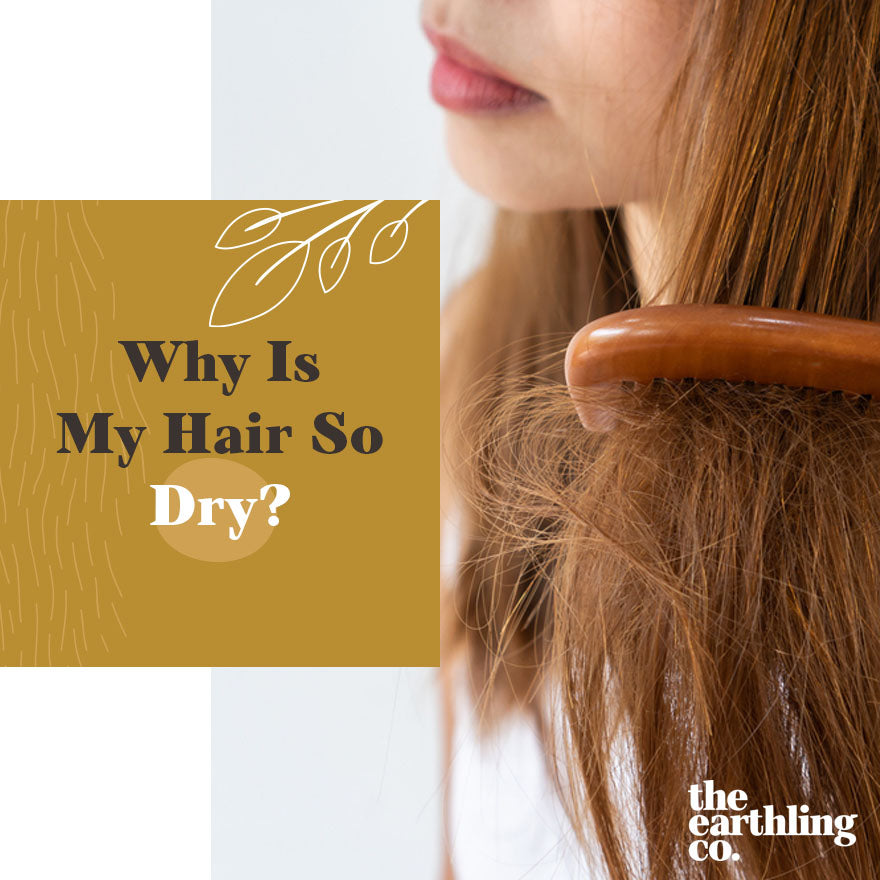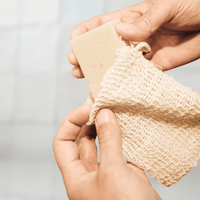
"Why is my hair so dry lately?" we hear you cry in frustration. "What am I doing wrong?" Well, you could do everything right with your hair care regimen and still suffer from parched strands if that's your natural hair type. But dry hair is often the result of many factors, including temperature changes, using hair care products with harsh chemicals and diet. Don't worry, though — we're here to help you get to the bottom of it!
As you may already know, your scalp is covered in small, oil-producing glands known as sebaceous glands. These microscopic organs in the skin produce sebum, an oily, waxy substance that coats, moisturizes and protects your hair. When our hair and scalp don't get enough of this natural oil, it can result in an itchy, flaky scalp and dry, brittle strands that feel like straw.
If this sounds depressingly familiar, don't stress because we've taken it upon ourselves to write this simple guide aimed at helping you troubleshoot the root cause of your dry hair. Below, learn more about the reasons your hair might be dry and how to restore moisture to your thirsty strands (hint: a hydrating shampoo bar is going to be your new best friend).
Shop Our Hydrating Shampoo BarsDry Hair vs. Damaged Hair: How to Spot the Difference
Before we tackle the question, “Why is my hair so dry?” — it’s important to note that there is a difference between dry hair and damaged hair. Dry hair occurs when your strands aren’t getting enough natural oils that are necessary to maintaining their normal appearance, whereas damaged hair refers to hair that has developed cracks in the cuticle (the outermost part of the hair shaft).
Dry hair is usually caused by a combination of things, including hormone imbalances, over-washing and using harsh shampoos.

Signs of dry hair include:
- Dullness
- Frizziness
- Coarse texture
- Brittleness
- Itchy scalp
- Dandruff
In contrast, damaged hair is most commonly associated with heat styling, excessive hair coloring and sun exposure.
Signs of damaged hair include:
- Uneven hair length
- Frizziness
- Brittleness
- Hair that gets easily tangled
- Limp curls (if you have curly hair)
- Split ends
Dry hair and damaged hair can have similar signs and symptoms, which means that many of the tips we’ll be sharing below for dry hair will also help improve the appearance of damaged strands. However, keep in mind that the only real way to fix damaged tresses is to visit your hairstylist, chop off the damaged parts and give hair a break from unhealthy habits (chemical treatments, too much heat styling, etc.).
What Causes Dry Hair?
As with your skin, there are a number of things that can sneakily strip the natural oils from your hair and scalp. Here are some of the most common culprits.
1. Over-washing
Rule number one for healthy, moisturized hair? Go easy on the washes. Getting your hair wet every day can strip too many oils from the scalp, which makes your hair prone to frizz and breakage.
Being overzealous with your washes can also mess with your scalp microbiome, or the diverse mix of bacteria that lives and thrives on your scalp. When this community of bacteria becomes unbalanced, bad bacteria can take over and cause problems like itchiness and inflammation.
2. Harsh products
If you have naturally dry locks, you need to be extra careful about your haircare products. Drugstore shampoos, conditioners and styling products are typically packed with harmful ingredients that trick you into thinking your hair is healthy with their instant gratification results.
Case in point: silicones. Commonly found in drugstore conditioners and styling creams, these hair-smoothing ingredients form a protective coating on the strand that makes your hair look shiny and feel silky-smooth. But in doing so, they block out vital nutrients and natural oils that help keep your hair healthy and hydrated.

Other haircare ingredients that are known to dry out hair include:
- Harsh surfactants (sodium lauryl sulfate, sodium laureth sulfate)
- Denatured alcohols (ethanol alcohol, propanol alcohol)
- Artificial fragrances
3. Weather changes
As much as we love the changing of the seasons, there’s no denying that the seasonal elements can be pretty tough on our hair (and our skin, for that matter). During the fall and winter, when temperature and humidity begin to drop, exposing our hair to the dry air essentially sucks all the moisture from our strands, making it brittle and dry.
Sadly, the warmer months aren’t much better for our tresses. During the spring and summer, ultraviolet rays are at their strongest. These harmful rays can beat down on our heads, making our hair turn crisp and dry and causing our hairlines to burn.
4. Aging and genetics
You may not have control over your genes or the aging process, but both play a role in how dry your hair is. Some people naturally produce less oil on their scalp, which results in less lubrication and moisture. Certain hair types are also more prone to dryness than others. For example, dry hair is a fairly common complaint among people with thick, curly or wavy hair, whereas those with fine or straight hair tend to suffer from the opposite problem (i.e., oily hair).
Additionally, aging can change hair texture over time. As we age, our bodies produce less oil, resulting in a drier, frizzier ’do.
5. Forgetting to comb and brush your hair
Brushing and combing our hair are often overlooked steps in our beauty routines, but they’re both essential to maintaining good hair health. Beyond eliminating pesky tangles and knots, taking a comb or brush to your hair on a daily basis can help redistribute the natural, healthy oils from your scalp to the ends of your hair so that every part of the strand is properly lubricated.
Before you take your favorite brush to your hair, though, make sure you’re not accidentally damaging your hair in the process. To avoid unnecessary breakage, take a wide-tooth bamboo comb to your ends and gently detangle your hair. Once your hair is knot-free, try using a boar bristle brush to move the healthy oils from the scalp to your parched ends.
6. Heat styling
If your go-to hair styling tools involve heat, just know you’re not doing your hair any favors. Heat styling tools, such as flat irons, curling wands and blow dryers can reach temperatures of more than 400 degrees Fahrenheit, which is more than enough to destroy the precious bonds in your hair and dry up the water molecules inside each strand.
Excessive use of heat styling tools can also break down the hair cuticle, which is your hair’s protective outer layer. When the hair cuticle is compromised, your hair is more vulnerable to strong sun, wind, cold air and other environmental factors.
7. Chlorine and salty water
We hate to be the bearer of bad news, but your favorite summertime activity may be ruining your mane. Going for a daily swim — whether it’s in a pool, a lake or an ocean — can be extremely drying to your strands. The more you get your hair wet, the more likely you are to wash away the healthy oils from your scalp.
Pools and hot tubs are especially drying to hair, thanks to their high chlorine levels. Regular exposure to chlorine can make hair dry and porous and, in some cases, can lead to discoloration. Ever heard of someone’s hair turning green after swimming in the pool all summer long? That’s because the copper in water reacts with the high chlorine content, causing blonde hair to take on a greenish tint.
Saltwater is also notoriously drying because salt attracts water molecules and pulls moisture away from your already-parched strands. This is also why sea salt spray can make your hair feel dry and crunchy. (Tip: If you want to achieve gorgeous, beachy waves without drying out your hair, try a homemade DIY sugar spray instead.)

8. Health problems
Many conditions are known to cause excessively dry hair, including:
- Underactive thyroid (hypothyroidism)
- Eating disorders
- Vitamin deficiencies
- Cushing’s syndrome
- Hormone imbalances
If you suspect your hair is dry due to medical reasons, consider making an appointment with your doctor. They can run a few basic tests to rule out a few underlying problems that could be contributing to your bone-dry hair.
How to Fix Dry Hair
Once you’ve identified the cause of your dry hair, you can start the process of fixing it. This may require a little patience on your end. Remember, your tresses didn’t become dry and crispy overnight, so the process of restoring them won’t happen overnight, either. Give your hair at least two months before you try a different solution.
1. Choose a gentle shampoo.
Using a too-harsh shampoo can do a number on your strands and, more often than not, sulfates are to blame. Fortunately, the fix is beyond simple: use a sulfate-free shampoo bar. Free of sulfates, parabens, phthalates and other harmful ingredients, our solid shampoo bars gently remove buildup from the scalp without removing the natural oils that keep it healthy and balanced. Nourishing plant oils like apricot kernel and coconut replenish the natural oils in your hair, while other hydrator helpers — glycerin and cocoa seed butter — help lock in moisture. The cherry on top? Our shampoo bars are plastic-free! Each shampoo bar replaces two to three plastic shampoo bottles, making them a smart choice for your hair and the planet.
Related: How to Use a Shampoo Bar
2. Use a silicone-free conditioner.
You probably know that conditioner makes your hair feel silky-smooth, but if you’re using one that has silicones, it could be making your strands dry. If your ultimate goal is to achieve healthy locks that are naturally smooth and shiny, reach for a moisturizing conditioner bar that doesn’t contain any silicones. Like our shampoo bars, our conditioner bars are entirely plant-based and chock-full of nutritious vitamins to help you grow a salon-worthy mane. Once you give them a try, you’ll never go back to the bottled stuff again!
Shop Our Conditioner Bars3. Wash hair less often.
Since water washes away the natural oils from your hair, cutting down on the frequency of your washes is a smart move. Don’t worry, though — we’re not suggesting you avoid bathing altogether! The next time you need to bathe, wear a reusable shower cap to avoid getting your strands wet.
You can also break your daily washing habit by using dry shampoo, which absorbs excess oil from the scalp to keep hair from looking greasy. Dry shampoo is particularly useful for heavy exercisers and athletes because it helps absorb sweat, which can make your strands dry and brittle. Just make sure you apply it before your workout; otherwise, it will simply cake on your wet, sweaty hair.
4. Add a hair oil to your routine.
Hair oils are mega-trendy these days, and it’s not difficult to see their appeal. Hair oils restore moisture to parched strands, add instant shine and make hair feel buttery soft without synthetic chemicals. Best of all, you apply hair oil by massaging it into your head, which helps boost blood circulation to the scalp for a stronger, healthier mane. Interested in giving hair oil a try? Start by applying a palmful of argan oil or coconut oil to your scalp and slowly work your way down to the roots to give them some much-needed moisture.
5. Eat a healthy diet.
Make sure your diet is full of foods that support healthy hair. Fatty fish like salmon, cod and sardines are loaded with omega-3 fatty acids that add shine to hair. Dark leafy greens contain a slew of amazing nutrients — vitamin A, iron, beta carotene and folate — that help keep hair moisturized and strong.
6. Wear a hat to protect hair from harsh weather.
Whether it’s the middle of summer or the dead of winter, wearing a hat is a great way to protect your mane from the elements. In the summer, wear a wide-brim hat and minimize sun exposure during the hottest times of the day. During the colder months, cover your head with a beanie and consider wearing your hair in loose braids to help prevent breakage.

Finding the Right Products for Your Dry Hair
Whether your hair is naturally coarse and dry, or your brittle strands are entirely your own doing, there are plenty of steps you can take to improve the look and feel of your hair. Step one, though, is to stock up on the right products. Something as simple as using a silicone-free hair conditioner bar could be the secret to soft, hydrated strands.
Want your best hair yet? Discover our solid shampoo and conditioner bars, bamboo combs and other earthling-friendly products at The Earthling Co. today!
Image Credits
Romanova Ekaterina/Shutterstock.com
abworks/Shutterstock.com
Natasha Pankina/Shutterstock.com
Kabachki.photo/Shutterstock.com
Opat Suvi/Shutterstock.com








